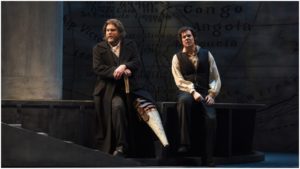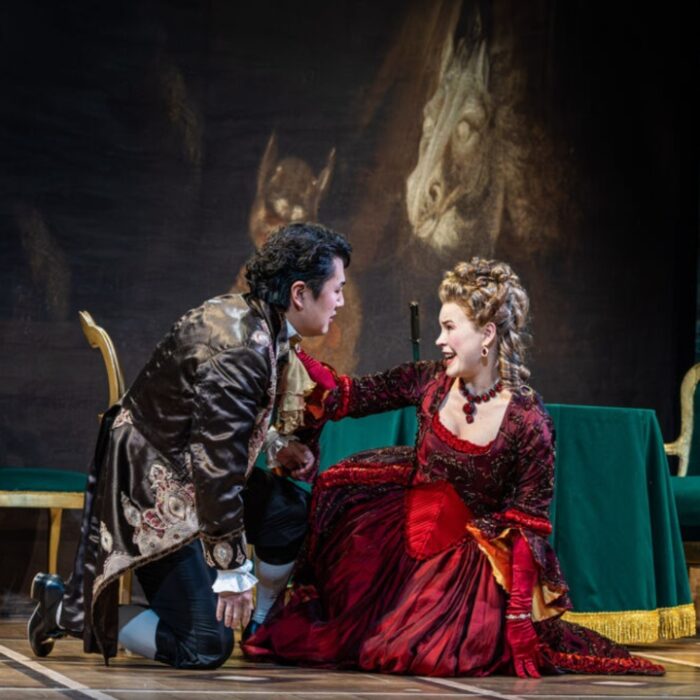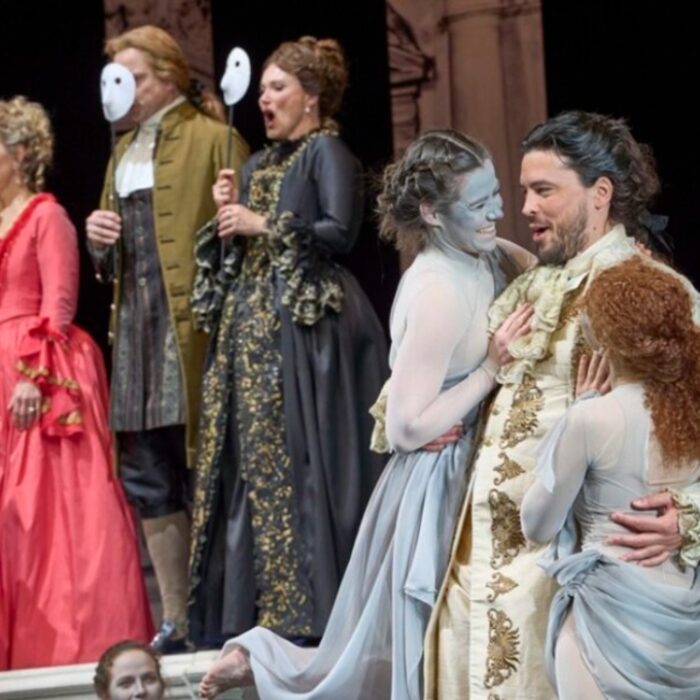
Opera San José 2018-19 Review: Moby Dick
A Vibrant & Intellectually Engaging Production Of Heggie & Scheer’s Masterpiece
By Lois Silverstein“Moby Dick” wasn’t a hit in Melville’s day. Instead, the author remained a customs officer until his death, his literary genius living mostly underground and his epic masterpiece under wraps until the 20thcentury, when it was “discovered.”
Composer Jake Heggie and librettist Gene Scheer’s opera “Moby Dick” has conversely sustained more success from the outset and this continued as their work came to life in its latest incarnation at Opera San José in a co-production with Utah Opera, Pittsburgh Opera, Chicago Opera Theater, and Gran Teatre del Liceu, Barcelona.
Wrapping Us Up
Director Kristine McIntyre has offered fresh moments in this gripping work, making the production in the beautiful California Theater in San José something to marvel at. McIntyre has limited projections of ocean and whaling, to spin the whole tale not only in the belly of the ship, The Pequod, but also from a centrifugal mast. We see a moving sky that galvanizes the story and opera’s vastness with its shifting constellations and gashes of lightning that appear and disappear from its vortex. Created by Set Designer Erhard Rom, and lit by Lighting Designer Pamila Z. Gray, it all worked well, especially with integration of the Chorus, performing on-going ship activities. This, in conjunction with the bold narrative confrontations, contributed much to emphasize down-to-earth ship life — e.g., mops and harpoons, jigs and dances, just as Ahab’s willful quest drove the story forward.
And so Melville, through McIntyre’s direction of Heggie and Scheer’s vision, thus continued his rightful legacy.
A small item flawed the otherwise successful shifting scenes and action: the whisking off stage of the front curtain before the Act two Finale, the rustling alone a distraction. A more significant item was the descent of the whale-eye at the Finale itself. The audience faced the Whale-Eye, but not Ahab. It bore into his back while he sang out to the audience. He “fell” into death rather than driving his harpoon into it, and all his rage and fury. This sacrificed the opportunity for a climactic and visceral confrontation of Ahab with his enemy, and as such disappointed.
Gripping Madness
From the lyrical, reflective, almost dreamy opening conducted by Joseph Marcheso and the Opera San José orchestra, the music set the tone for the introspective core of the work. While Marcheso firmly gripped us with the opera’s intense bolts of madness and action, his finesse with the introspective elements successfully threaded the two acts of the whale chase with its exploration of the meaning of life itself. The moving melodic richness, expressed in duet and trio and quartet, and particularly soliloquys such as Starbuck’s”Lost in the Heart of the Sea,” Queequeg’s haunting “Funi Ali”chant, and Greenhorn’s “Human Madness,” wove the worlds of action with contemplation.
Marcheso allowed the characters to probe their dilemmas with moving skill: Ahab’s revenge quest, Queequeg’s homeward longings, Starbuck’s ethical questions of evil and good, and Greenhorn’s questions of purpose as well as his deepening friendship with Queeguag, the master Harpooner. Cut off from daily land life, here we have a musical representation of not only the whaling enterprise, but human beings reaching for meaning through space and time. Heggie’s blending of the dark and dramatic with the haunting lyricism not only makes us pause, but also asks us to analyze the choices we as humans have in trying to balance chaos and order. Here, on the ship of fools, we venture into the dark and light of our primordial human experience.
A Peg Leg & Strong Tenor
The cast was good: Tenor Richard Cox as Ahab, stabbed the deck with grace and ease on his peg leg. It supported and never obstructed or interfered with his singing. It was part of him, and never let him forget what he calls his “dismasted” self. His plangent voice traced Ahab’s emotional trajectory of hate and longing with ease, especially during “For hate’s sake I spit my last breath at thee.” Sometimes, however, the length of prose-like and philosophically weighty sentences robbed him the opportunity to soar and gnarl and spew out anger as much as he might have. He seemed to talk his way through despair and anger rather than dramatize it. As a result, emotional depth sometimes felt halted. Exposition of issues provided no substitute for dramatization of them.
As a consequence, Cox’s Ahab became more of an human and less of a demonic character. He was understandable and accessible, a major focus of director McIntyre’s intention. For example, in Act one, the explanation of his previous fight with the whale diluted some of the mystery and darkness surrounding the Captain of the ship and gave us reason rather than force.
Colliding Philosophies
So too Queegqueg, sung by Bass-Baritone, Ashraf Sewailam, became more appealing rather than enigmatic, if more sentimentalized as a surface force rather than a dark riddle. Indeed, his appearance and waving to Greenhorn through one of the ship’s portals at the finale, almost nullified Melville’s existential message, diminishing the formidable confrontation of human being with emptiness. Overall, however, the rich timbre of his voice, while it occasional garbled lower notes, pegged us to the floor of the sea, and, in a sense, to the bottom of the world, where such drama seemed to be generated.
First Mate Starbuck was sung by Baritone Justin Ryan, in an ample and often lustrous voice. He had a ton to contend with – being the man of Christian conscience and a loyal compatriot to his captain and crew. The subject matter ranged from obedience to fidelity and fealty and such emotional freight gave us the illusion that he was on stage and singing the whole time. His presence pinpointed a traditional American and Christian view active the whole time, while pagan and atheist, Manichean, and Zoroastrian, tipped the edges. Plaintive and pleading was Starbuck’s role, his voice significantly boosting that perspective.
Greenhorn, performed by Tenor Noah Stewart in his Opera San José debut, offered a strong and immediately present middle register; his ease on stage and his animated physical movement well- illustrated his curious nature. Stewart strained on top notes a number of times, but his ability to ease down to convey his fundamental expressiveness made that strain less significant.
So too, his successful stage presence diminished those moments when he waxed glib, i.e., playing the “greenhorn” more than personifying the character “Greenhorn,” a name a la Dickens, that ruffled more than pleasured. The final declaration of Melville’s famous first line, however, made up for that, his final declaration “Call Me Ishmael” a moving moment as he floats on the coffin at the climax. His duet with Queequeg on the double mast worked its magic both vocally and visually as well.
Pip, performed with brightness and good dramatic effect by Soprano Jasmine Habersham, was an excellent antithesis to the weight of Ahab and his peg leg; and the weighty thrust of the men in their dark despair. Habersham’s Pip, the pants’ role of a a 14-year-old boy, was indeed the “seed” out of which human reality grows. From madness through the mayhem of such fundamental challenges, the clink of his tambourine provided a poignant contrast to the vast sounds in which we were otherwise suspended. Ahab’s line, “Boy – go below to my cabin; you’ll find Pip there,” accented the truth that such a seed planted and grew.
Stubb, Flask, Daggoo, Gardiner shored up the cast with ample and forthright performances, along with the Chorus, under the leadership of Christopher James Ray.
Not only did the universality of theme come successfully alive in the McIntyre-Marcheso production, but so did the diversity of person/ethnicity and religious convictions. Opera San José has done justice to this grand opera’s high seriousness and weight.


